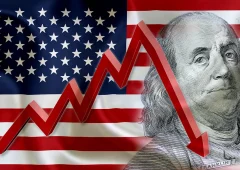Here is Why a Surprise Rate Cut Could be Bad for the Markets
31.07.2024 15:39 2 min. read Alexander Stefanov
Investors are eagerly anticipating a signal from the Federal Reserve regarding potential interest rate cuts in September, but a sudden move this week could have negative consequences for the markets.
Rob Haworth, a senior investment strategist at U.S. Bank, warned that an unexpected rate adjustment could disrupt the equity market and lead to a sell-off in Treasury securities. Such a surprise could be seen as a breach of protocol, which might spark concerns about underlying issues in the economy or financial system.
Current Fed-funds futures suggest only a slim chance of a rate cut being announced at the conclusion of this week’s meeting. However, many economists, including former Fed officials, argue that a rate reduction is overdue.
William Dudley, a former New York Fed president, and Alan Blinder, former Fed Vice Chair, have both indicated that a rate cut could be justified given recent economic data.
Despite the expectations for a potential September cut, a surprise adjustment this week could unsettle investors, according to Michael Green, chief strategist at Simplify Asset Management.
He noted that while seasonal factors may have distorted recent inflation readings, the Fed’s previous aggressive rate hikes have not yet fully addressed the economic impacts.
The S&P 500 and other indices have shown mixed performance, with small-caps and tech stocks experiencing recent fluctuations. Investors are closely watching the Fed’s decisions, which could either boost market confidence or lead to increased volatility, particularly if expectations for a September cut are not met.
-
1
U.S. Recession May Already Be Locked In, Economist Warns
23.06.2025 12:00 1 min. read -
2
Tom Lee Warns Fed Could Trigger Market Turmoil With Delayed Pivot
22.06.2025 19:00 3 min. read -
3
Trump Targets Fed Over Missed Rate Cut Opportunity
20.06.2025 9:00 1 min. read -
4
Fed’s New Projections Hint at a Slower Easing Cycle Through 2026
19.06.2025 15:00 2 min. read -
5
UK Inflation Stalls at 3.4%, Spotlight Shifts to BoE’s August Meeting
19.06.2025 9:00 2 min. read
Robert Kiyosaki Predicts When The Price of Silver Will Explode
Robert Kiyosaki, author of Rich Dad Poor Dad, has issued a bold prediction on silver, calling it the “best asymmetric buy” currently available.
U.S. PCE Inflation Rises for First Time Since February, Fed Rate Cut Likely Delayed
Fresh data on Personal Consumption Expenditures (PCE) — the Federal Reserve’s preferred inflation gauge — shows inflation ticked higher in May, potentially delaying the long-awaited Fed rate cut into September or later.
Trump Targets Powell as Fed Holds Rates: Who Could Replace Him?
Federal Reserve Chair Jerome Powell is once again under fire, this time facing renewed criticism from Donald Trump over the Fed’s decision to hold interest rates steady in June.
U.S. National Debt Surge Could Trigger a Major Crisis, Says Ray Dalio
Billionaire investor Ray Dalio has sounded the alarm over America’s soaring national debt, warning of a looming economic crisis if no action is taken.
-
1
U.S. Recession May Already Be Locked In, Economist Warns
23.06.2025 12:00 1 min. read -
2
Tom Lee Warns Fed Could Trigger Market Turmoil With Delayed Pivot
22.06.2025 19:00 3 min. read -
3
Trump Targets Fed Over Missed Rate Cut Opportunity
20.06.2025 9:00 1 min. read -
4
Fed’s New Projections Hint at a Slower Easing Cycle Through 2026
19.06.2025 15:00 2 min. read -
5
UK Inflation Stalls at 3.4%, Spotlight Shifts to BoE’s August Meeting
19.06.2025 9:00 2 min. read


